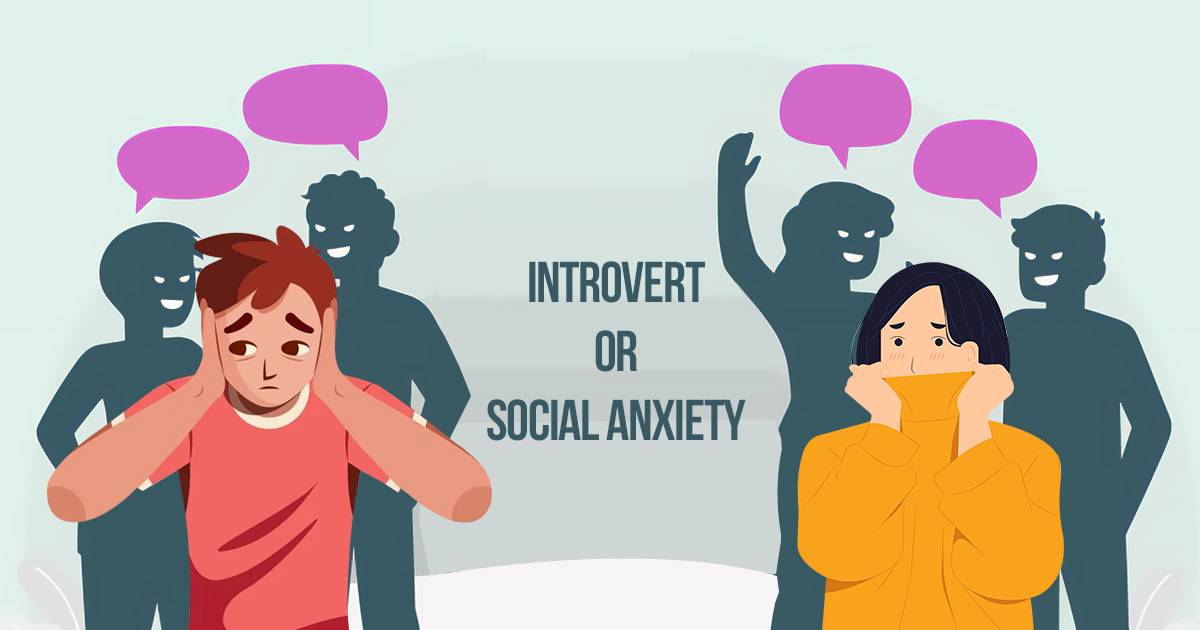Introvert or Social Anxiety: Exploring Personal Dynamics

Being an introvert and having social anxiety are two very different things, but they are often confused or used interchangeably. While introverts and people with social anxiety may share some overlapping characteristics, the underlying causes, thought processes, and experiences are quite distinct. Learn the major differences between being an introvert and having social anxiety disorder.
What is an introvert?
An introvert is someone who feels more invigorated and recharged while alone or in peaceful environments. They usually prefer doing things by themselves or with a few close friends instead of going to big social gatherings. Introverts may feel exhausted or overwhelmed after spending a lot of time with others and want some alone time to recover.
Introversion is a natural way some people are, not a problem or a choice. It means they like to take things in more slowly and might not need as many social interactions to feel happy. Introverts can still be good at socializing when they want to, but they often prefer deeper conversations with fewer people.
Key Characteristics of Introversion:
- Prefers solitary activities or small group settings
- Recharges by spending time alone
- Enjoys deeper conversations over small talk
- May be introspective and thoughtful
What is social anxiety disorder?
Social anxiety disorder, on the other hand, is a mental health condition where someone feels extremely scared or nervous in social situations. They may be overly concerned with what others think of them and are afraid of being embarrassed or judged. When they are with people, their nervousness can manifest as bodily signs such as perspiration or a rapid heartbeat.
Unlike introversion, social anxiety disorder is more than just a personality trait; it’s a condition that can make it hard for people to do everyday things like work or make friends. People suffering from social anxiety may avoid social interactions to relieve their fear, which might exacerbate the problem.
Key Characteristics of Social Anxiety:
- Intense fear or anxiety in social situations
- Fear of being judged or embarrassed
- Avoidance of social situations
- Physical signs include sweating, shaking, or rapid heartbeat.
Difference Between Introvert and Social Anxiety
While introverts and individuals with social anxiety may share some similarities, such as a preference for quieter or smaller social settings, several key differences set them apart:
Choice vs. Fear
Introverts choose to spend time alone or in smaller groups because it aligns with their natural preferences and energy levels. People with social anxiety, on the other hand, frequently avoid social events out of fear or anxiety, even if they want to make social connections.
Social Skills
Introverts can be socially skilled and enjoy social interactions when they are in the right setting and with the right people. Those with social anxiety often struggle with social skills due to their intense fear and anxiety, which can lead to avoidance or awkward behavior in social situations.
Energy Levels
Introverts feel drained or overstimulated after prolonged social interactions and need time alone to recharge. People with social anxiety may feel exhausted or anxious before, during, and after social situations due to their intense fear and physical symptoms.
Thought Processes
Although introverts may prefer quieter environments, they typically don’t worry excessively or irrationally about what other people will think of them or reject them. People with social anxiety, on the other hand, often have distorted thoughts and beliefs about social situations, such as catastrophizing or assuming the worst.
Physical Symptoms
While introverts may feel mentally drained after social interactions, they typically don’t experience severe physical symptoms like sweating, trembling, or a racing heartbeat. Individuals suffering from social anxiety disorder frequently have physical signs of anxiety.
Can introverts have social anxiety?
Some people can be both introverted and socially anxious. Research suggests that because introverts are more focused on their inner thoughts and can be easily overwhelmed, they might be more likely to develop social anxiety.
However, not all introverts suffer from social anxiety, and not all people with social anxiety are introverts. Extroverts can also have social anxiety, and introverts can feel confident in social situations they’re comfortable with.
When an introvert has social anxiety, they might feel even more anxious and avoid social situations, even ones they would normally enjoy. This combination of introversion and social anxiety can make it difficult to connect with others and feel comfortable in social situations.
Social Anxiety vs. Introversion: Distinguishing the Difference
Introversion and social anxiety are quite different. Introversion is simply a personality preference for quiet, while social anxiety involves an intense fear of social situations. Understanding this difference is important. Introverts can embrace their nature without confusing it with an anxiety disorder.
For those who are introverted and have social anxiety, there are ways to manage the anxiety while still honoring the need for solitude. By accepting our unique selves and getting help when needed, we can create satisfying lives and connections, whether we’re introverts or extroverts.
